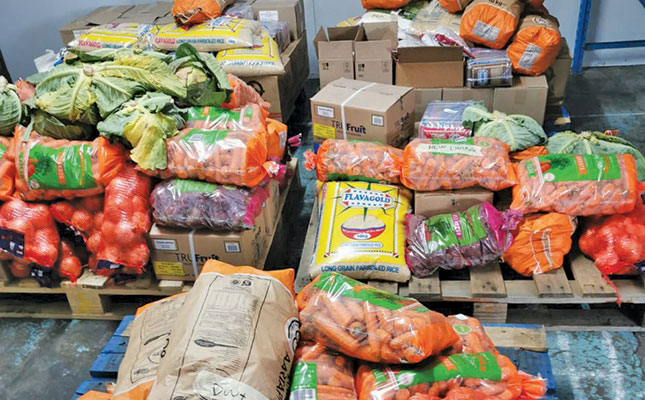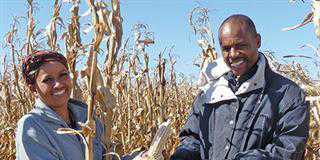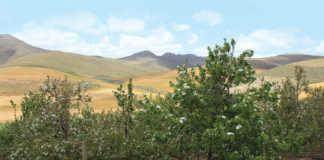
Photo: SA Harvest
SA Harvest started out small in 2019, with a single truck in a single city and only three employees, recalls Regional Manager Ali Conn.
He adds that the organisation was formed in direct response to many issues that plague not only South Africa’s food system, but global systems worldwide.
“About 10 million tons of food go to waste in South Africa each year,” says Conn. “At the same time, we have millions of South Africans on the verge of starvation and even more who are food-insecure.”
This while South Africa produces more than enough food to feed all of its people.
“Our food system is broken, but that doesn’t mean it can’t be fixed. SA Harvest is taking responsibility for doing just that.”
Based on an Australian model called OzHarvest, which has delivered more than 120 million ‘rescued’ meals to date, SA Harvest was founded by social activist Alan Browde and is chaired by entrepreneur and philanthropist Gidon Novick, who founded Kulula.com and Discovery Vitality.
According to Conn, SA Harvest is an end- to-end food rescue solution service and deals with perishable and non-perishable foods. The organisation collects excess fresh food from a wide range of suppliers, including farmers, retailers, restaurants, airlines and events.
“We work with fresh produce, frozen foods, dry goods and everything in between, as we have the resources and documentation required to work with all food types to ensure that we can rescue enough food with nutritional value to distribute,” notes Conn.
To ensure that it provides enough fresh food to its beneficiaries, SA Harvest relies heavily on South Africa’s agriculture sector.
“Farmers often seem to have surplus food that they can’t use as it might not meet the aesthetic standards required by most retailers,” says Conn. “Before it’s thrown out, we collect and distribute it to those in need. It’s all still edible.
“This also enables us to supplement other less nutritious donations with wholesome foods full of vitamins and minerals.”
Conn believes that farmers, too, need more support; for this reason, SA Harvest is exploring ways that it can benefit them, too.
“We’re looking at creating a network between small-scale farmers, and finding alternative ways to get their produce to markets.”
Donated food is trucked to the organisation’s warehouses, where it is sorted into packages that are delivered daily to its network of beneficiaries.
Currently, SA Harvest supports more than 50 large non-profit organisations across the country.
“Each, in turn, supports between 100 and 900 beneficiaries and soup kitchens, so we have a large reach,” says Conn.
Major role
At its inception, SA Harvest distributed between 1 000 and 5 000 meals a month. A year later, it was delivering between 80 000 and 200 000 meals a month and had increased its staff to 27 permanent employees.
“Since the start of the COVID-19 lockdown in March, we’ve distributed more than three million meals to people in impoverished areas,” says Conn.
However, according to SA Harvest’s own assessment, there is an urgent need for at least four times this quantity in the areas it services.
Conn says that the pandemic has had a significant effect on SA Harvest’s growth.
“It was the great impetus to people to lend their minds and hearts to what’s really important in life. Generosity and humanity have really played major roles.”
SA Harvest’s operations are based mainly in Cape Town, Johannesburg and Durban. Micro-hubs are located in Nelson Mandela Bay, Bloemfontein and Mbombela.
Its warehouses are all equipped with health-grade dry- and cold-storage facilities, and it operates its own fleet of refrigerated trucks.
“With dedicated logistical services, we can be fleet-footed and reach places few others can. These include rural areas,” says Conn.
In addition to sourcing and distributing food, SA Harvest is investing in the creation of small, efficient farms that give entrepreneurs an opportunity to make a living while providing more affordable healthy food to surrounding communities.
The first project, which is already under way, is based at the Walter Sisulu Education Centre in Mamelodi, Tshwane. Here, SA Harvest is developing 1,3ha, which will be transformed into a diverse food-producing for-profit business using sustainable farming methods.
“We’re developing similar farming projects to educate communities, and the initiatives will also be used to improve the nutritional value of the food we deliver,” says Conn.
Technology platforms
Also important are childhood development and care for the elderly. “While we don’t discriminate between our beneficiaries, we place special priority on these age groups as they’re often not in a position to fend for themselves,” explains Conn.
“Precooked meals go a long way to ensuring they get the sustenance they need to develop healthy bodies and minds. To this end, establishing school programmes and farming schemes are a top priority.”
According to Conn, food relief has become tainted by competition and secrecy, and this cannot continue if South Africa is to solve its food problem.
“Everyone needs to work together. SA Harvest is therefore developing technology platforms that will create transparency and facilitate conversation. Through data, we can reach further afield, and ultimately attain our goal of feeding the nation through partnerships with like-minded organisations.”
Future plans
“The momentum and drive we’ve built up over the last few months is only going to grow, and we implore all South Africans and companies to get involved in this exciting journey,” says Conn.
“As Nelson Mandela demonstrated, one person can change a nation, but it takes the collective whole to change the world, and SA Harvest is dedicated to doing just that.”
Phone SA Harvest on 072 486 0618, or email [email protected].











